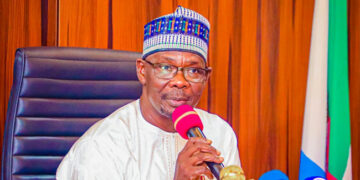The Resource Centre for Human Rights and Civic Education (CHRICED) has strongly criticised the Federal House of Representatives Committee’s recent proposal to amend the 1999 Constitution and create 31 additional states across Nigeria’s six geopolitical zones.
CHRICED stated that this move would increase the total number of states from 36 to 67 if approved.
Speaking to journalists yesterday in Abuja, CHRICED’s Executive Director, Ibrahim Zikirullahi, raised concerns over the proposal’s timing and feasibility.
He described the initiative as a “grand strategy for political deception and distraction,” arguing that Nigeria currently lacks the financial capacity to sustain additional states, especially amid economic challenges such as hyperinflation and budget deficits.
He warned that the move would increase the number of states from 36 to 67, further straining the country’s limited resources if implemented.
Zikirullahi expressed concern that while millions of Nigerians struggle with economic hardship, political leaders focus more on expanding governance structures than strengthening existing ones.
“Most states today cannot even pay workers’ salaries without federal allocations, yet lawmakers want to create more. Instead of pursuing initiatives that serve political interests, they should focus on policies that will improve governance and the lives of Nigerians,” he said.
He added that increasing the number of states would inflate governance costs, widen inequality, and fail to address fundamental governance issues.
Despite rejecting the 31-state proposal, CHRICED backed the constitutional recognition of Abuja as Nigeria’s 37th state, arguing that it would end the long-standing marginalisation of its original inhabitants (OIs).
“Currently, Abuja’s indigenous people suffer from statelessness, landlessness, and political marginalisation. Recognising Abuja as a state would help address these historical injustices,” he stated.
Rather than creating more states, CHRICED recommended: “Returning to a regional government system, using the six geopolitical zones as federal entities.
“Devolving power and resources from the central government to the regions, reducing governance costs to free up resources for development.”
He also urged lawmakers to shift their focus to critical national issues, including: “Corruption – Implement decisive measures to combat corruption and ensure accountability.
“Insecurity – Strengthen security to protect citizens and economic activities, electoral Reforms – Improve transparency and fairness in elections.
“Unemployment – Create job opportunities, especially for youth, lowering the cost of governance – Cut government waste and inefficiencies, economic hardship – address excessive taxation and unjustified bank charges.
He also warned against the gradual erosion of Nigeria’s democracy, cautioning that an unchecked ruling party could lead to authoritarianism and dictatorship.
“When a single party dominates, dissent is silenced, and democracy weakens. Nigerians must actively participate in politics to protect our democratic rights,” he said.
He called on all Nigerians to resist political distractions and demand meaningful reforms to improve governance, economic conditions, and national security.
“The future of our nation depends on our ability to hold leaders accountable and push for a government that truly serves its people,” he added.





